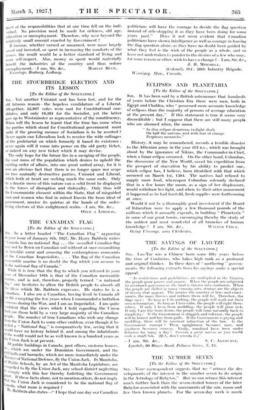• ECLIPSES AND PLANETARIA [To the Editor of the SPECTATOR.]
SIR,—It has been said by a British astronomer that hundreds of years before the Christian Era there were men, both in Egypt and Chaldea, who " possessed more accurate knowledge of eclipses than the majority of persons of average education at the present day." If this statement is true it seems very discreditable ; but I .suppose that there are still many people who are alarmed when, the moon " In dim eclipse disastrous twilight sheds
On half the nations, and with fear of change Perplexes monarchs."
History, it may be remembered, records a terrible disaster to the Athenian army in the year 413 n.e., which was brought about by the ignorance of Nikias, the Commander-in-Chief, when a lunar eclipse occurred. On the other hand, Columbus, the discoverer of the New World, saved his expedition from the prospect of starvation by his ability to predict one, which eclipse has, I believe, been identified with that which occurred on March 1st, 1504. The natives had refused to supply more food, whereupon Columbus solemnly declared that in a few hours the moon, as a sign of her displeasure, would withdraw her light, and when to their utter amazement it happened as he had foretold, fresh supplies were forthcoming at once.
Would it not be a thoroughly good investment if the Board of Education were to apply a few thousand pounds of the millions which it annually expends, in building " Planetaria " in some of our great towns, encouraging thereby the study of the noblest and Most wonderful of all branches of human
knowledge ? --I am, Sir, &e., WALTEit CRICK. Ching Vicarage, near Chichester.






























































 Previous page
Previous page